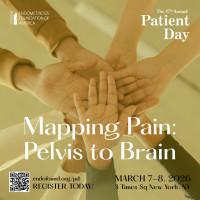
Like many people who experience sexual assault, I didn't say anything about what happened to me for many years but I did try my best to process the trauma on my own and reclaim my body. As it turns out, the experience of being a patient with chronic pelvic pain does not lend itself to reclaiming one's body. The endless exams and questioning from doctors over the last 10 years as I have searched for answers to my pain have impacted me deeply. I have left so many appointments feeling like a body, a patient, a shell of the vibrant person that I am.
According to the National Sexual Violence Resource Center, 81% of female-identified patients and 43% of male-identified patients have experienced sexual harassment and/or assualt in their lifetime. This statistic alone is enough to warrant better trauma-informed care for everybody. BIPOC and queer patients already face discrimination at a systemic level within the healthcare system, and the intersection of these identities and experiences can mean inadequate care at best and physical harm at worst. We are long past the canary in the coal mine—this is a full-blown epidemic that medical professionals must take into account when interacting with every patient.
For patients with chronic pelvic pain, exams can be clinically normal despite underlying conditions. For me, doctor appointments cause an anxiety spike because they are a continuation of this sense that my body does not belong to me. It still belongs to the doctor who refused to prescribe birth control unless I had a serious boyfriend. It belongs to the nurse practitioner who blamed my mental health for my symptoms after I described my history of cysts and surgery. It belongs to the nurse who woke me up after my emergency oophorectomy and told me that I could still have babies before she told me anything else about my own body. Every medical professional who has seen me as a case and not a person has left me shaking and promising myself that next time I'll find a provider who won't leave me with more pain than I came in with.
I understand that doctors have limited time with patients and that medicine is a practice and not a ‘perfect.’ However, if we are to truly care for the whole person and not specific symptoms, we need to implement systemic changes.
This all clicked when I went to see a new physical therapist and before she performed an internal exam, she sat beside the bed and asked if my body was ready for that stress on that particular day. The simple question opened the floodgates and I found myself crying because she saw me as a human being worthy of her compassion and time. Her approach changed my expectations for the way providers treat me.
According to the Trauma-Informed Care Resource Center, “A trauma-informed approach to care acknowledges that health care organizations and care teams need to have a complete picture of a patient’s life situation—past and present—in order to provide effective health care services with a healing orientation.” The principles of this approach teach providers how to avoid re-traumatizing a patient and to better recognize the signs and symptoms of trauma in patients, families, and staff.
For patients with endometriosis, we know that diagnosis comes after an average of 7-10 years. So what do we do about the additional traumas of misdiagnosis, of repeated pelvic exams, and of being dismissed by authority figures at every turn? This should warrant the presence of a mental health professional for each patient who has had to fight to be heard. These mental health services should be covered by commercial insurance, Medicare, and Medicaid and should focus on validating our experiences as patients and people.
Trauma-informed care should be the standard. Perhaps it needs to be said again for insurance companies, medical professionals, drug manufacturers, and patients to all be on the same page: trauma-informed care should be the standard—and it should encompass the traumas caused by the healthcare system during years of misdiagnosis.









